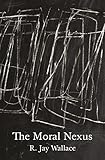The Moral Nexus / R. Jay Wallace.
Material type: TextSeries: Carl G. Hempel Lecture Series ; 9Publisher: Princeton, NJ : Princeton University Press, [2019]Copyright date: ©2019Description: 1 online resource (328 p.)Content type:
TextSeries: Carl G. Hempel Lecture Series ; 9Publisher: Princeton, NJ : Princeton University Press, [2019]Copyright date: ©2019Description: 1 online resource (328 p.)Content type: - 9780691172170
- 9780691183923
- Normativity (Ethics)
- PHILOSOPHY / Ethics & Moral Philosophy
- adults
- agent
- blame
- claimholders
- deliberation
- interpersonal accountability
- interpersonal morality
- moral duties
- moral duty
- moral equals
- moral nexus
- moral obligation
- moral obligations
- moral relations
- moral requirements
- moral standards
- moral theory
- moral thoughts
- morality
- normative features
- normative significance
- philosophical account
- relational interpretation
- relational morality
- relational obligations
- relational requirements
- right
- self-standing
- wrong
- 170.42 23
- BJ1458.3 .W355 2019
- online - DeGruyter
- Issued also in print.
| Item type | Current library | Call number | URL | Status | Notes | Barcode | |
|---|---|---|---|---|---|---|---|
 eBook
eBook
|
Biblioteca "Angelicum" Pont. Univ. S.Tommaso d'Aquino Nuvola online | online - DeGruyter (Browse shelf(Opens below)) | Online access | Not for loan (Accesso limitato) | Accesso per gli utenti autorizzati / Access for authorized users | (dgr)9780691183923 |
Frontmatter -- Contents -- Acknowledgments -- 1 Introduction -- 2 The Problem of Moral Obligation -- 3 Morality as a Social Phenomenon -- 4 Relational Requirements without Relational Foundations -- 5 From Interests to Claims -- 6 Some Practical Consequences -- Notes -- Bibliography -- Index
restricted access online access with authorization star
http://purl.org/coar/access_right/c_16ec
The Moral Nexus develops and defends a new interpretation of morality-namely, as a set of requirements that connect agents normatively to other persons in a nexus of moral relations. According to this relational interpretation, moral demands are directed to other individuals, who have claims that the agent comply with these demands. Interpersonal morality, so conceived, is the domain of what we owe to each other, insofar as we are each persons with equal moral standing.The book offers an interpretative argument for the relational approach. Specifically, it highlights neglected advantages of this way of understanding the moral domain; explores important theoretical and practical presuppositions of relational moral duties; and considers the normative implications of understanding morality in relational terms.The book features a novel defense of the relational approach to morality, which emphasizes the special significance that moral requirements have, both for agents who are deliberating about what to do and for those who stand to be affected by their actions. The book argues that relational moral requirements can be understood to link us to all individuals whose interests render them vulnerable to our agency, regardless of whether they stand in any prior relationship to us. It also offers fresh accounts of some of the moral phenomena that have seemed to resist treatment in relational terms, showing that the relational interpretation is a viable framework for understanding our specific moral obligations to other people.
Issued also in print.
Mode of access: Internet via World Wide Web.
In English.
Description based on online resource; title from PDF title page (publisher's Web site, viewed 21. Jun 2021)


